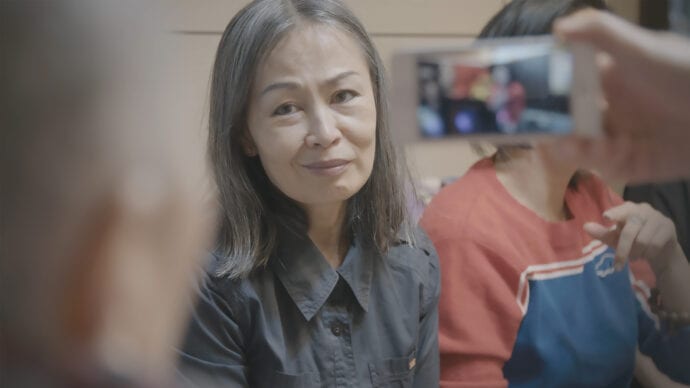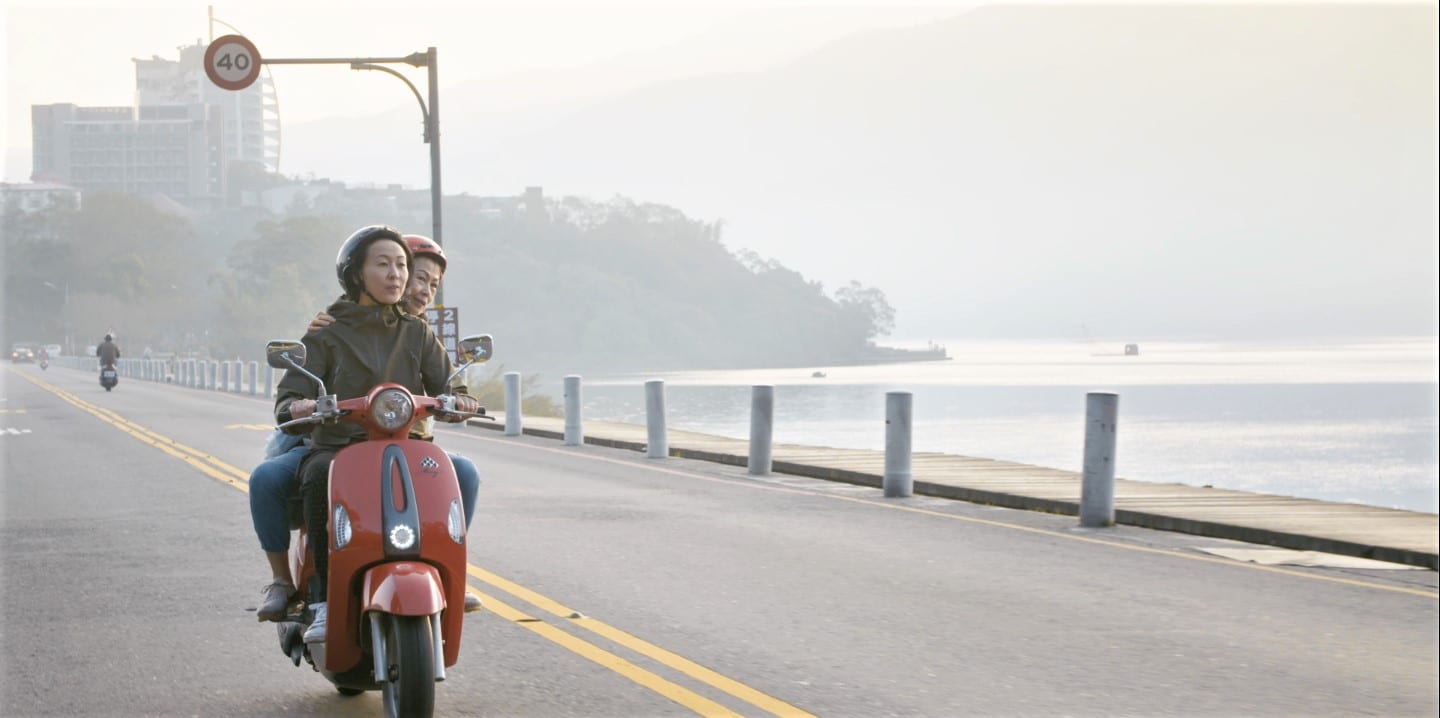Canadian director Tiffany Hsiung has never shied away from unspoken histories. Her debut feature length documentary, The Apology, focused on three former “comfort women”—among the almost quarter of a million girls and young women kidnapped and forced into sexual slavery by the Imperial Japanese Army during the Second World War—as they sought acknowledgment for the violence enacted upon them. There’s a palpable sense of care in Hsiung’s filmmaking, which often acts as a form of healing for the people whose stories she shares With her newest short film, Sing Me a Lullaby, now streaming on CBC Gem, the director turns her focus to her mother, Ru -Wen, who was separated from her family in Taipei when she was only five. Forty year later, Hsiung shows us how Ru Wen still struggles with the pain of this split. Hsiung travels to Taiwan, camera in hand, in an attempt to find Ru -Wen’s mother. Filmed over the course of 14 years, the film juggles geographies, times, nations and cultures as Hsiung tries to connect the pieces of her mother’s fragmented past, as well as reconcile how their own relationship has been shaped by her experience. An intimate study of the afterlife of family histories, Sing Me a Lullaby is ultimately shaped by compassion for the complexities of its story and the constellation of feelings it inspires. Just after the film’s premiere at TIFF this past September, Xtra sat down with Hsiung to talk about seeing the world through the lens of a middle child, the importance of honouring boundaries in documentary filmmaking, and the ways in which the binds of time and awareness weigh on our most important relationships.
Looking at your work as a whole, it’s clear that you have a natural instinct to bear witness to the hidden or unspoken histories of women. Can you talk to me about taking on this strand of your mother’s story as a film?
When I was making The Apology my mother had asked me when I was going to finish her story. I always had this burning feeling that her story needed to be told, especially before she passes away. So the moment The Apology was completed, I jumped back into filming Sing Me a Lullaby. For me, the process of making this film never ended; it lived alongside everything I did in those 14 or 15 years. In many ways, Sing Me a Lullaby is the prequel to The Apology. The universality of the relationships we have with our mothers and elders—these figures who hold so much resilience within themselves and have gone through so much incredible sacrifice—really finds its foundations [in this film]. It’s the observations of a middle child, of seeing things around me while I was growing up and watching the way that my mother navigated the world and how that was so different from my father—to me it always felt unfair. I was very stubborn and always wanted to challenge things by asking questions and fighting back. I did that a lot growing up—not just with my siblings, but with my mother specifically. It’s funny watching the movie now and seeing the relationship my mom and I have. Stories always continue well after they are made, and I think that I’ve had this incredible opportunity that many other children don’t get: Tto learn something before their parent learns it—not only for, but about, themselves. The opportunity to see my mother as human first, rather than as a mother first, welcomes a different type of dimension into our relationship. It changes the way you understand your parent and how you communicate with them.
Can you speak to the timeline of the film? I think that durational elements in terms of both your filmmaking and storytelling process are clearly something that resonates throughout your other work, too.
My timeline is never on purpose. I’m so fortunate that I allowed myself time to make Sing Me a Lullaby—it wasn’t intentional by any means. While I was filming it, I thought that maybe I had done something wrong, opened up wounds that maybe shouldn’t have been opened up. I questioned that for a period of a time and stopped wanting to delve any further into it. My mother and most people in my family avoided this history and the things that it brings up. When I first started filming I thought that I would finish the film quickly; I was 21 at the time and filled with confidence. But I needed to grow up in order to finish. Because of my work on The Apology, I came to understand how other people’s secrets come to be unravelled right before my eyes. It’s not just stories from the past—it’s witnessing people’s truth in real time. It does something to you. It inspires you, but it also makes you understand the weight of what a secret does to someone. I feel very fortunate [with The Apology] that I was able to capture and share that story with people, but it also taught me to be more at peace with the story that I had captured early on in the filming of Sing Me a Lullaby.
Early on the film, you speak about your mother’s inclination to stay quiet about certain things, a trait you see as common among traditional Chinese families—what you refer to as “minding our own business.” Can you speak to being raised within an environment that left things unspoken?
My family has gone through so much [with] both myself and my siblings poking and prodding them. On the one hand, part of that is our desire to disrupt traditions and break the mould, but on the other hand, I know now it’s also necessary to respect why things are the way that they are. I am very proud to be Chinese, I am so proud of how rich our culture is, and I am proud of the sacrifices [that my family has made]. Yes, it’s frustrating as hell to be in these spaces where someone feels they have to be the sacrificial lamb to prove something; you become so annoyed and want to fight against it. But I think it’s our responsibility to be both respectful and mindful of how and why certain choices are made. Being raised in the West, we tend to adopt a lot of firm ideas regarding what is or isn’t the right way to act or be. I don’t think that’s fair: It was part of the growing process for me to let go of that way of thinking.
There are so many intimate moments within the film. How do you draw boundaries in regards to what can be shown and what can remains private?
In all of my films and in every documentary I will ever make, my motto is that the director is the safekeeper of the characters they show. I will never jeopardize the people who drive the stories that I have been given the privilege and permission to document. Respecting the people I’m capturing and understanding that this is a legacy wherein their stories are being preserved is what matters to me. Boundaries are crucial to the stories that I want to tell. I found a video journal of myself when I was 22 or 23, and I was telling myself: “If future me is watching this footage, as long as your intentions are true and pure, and for the right reasons, don’t be scared. Keep going.” That is still true to this day. There are definitely difficult decisions to be made [as a documentarian], but I also refuse to sensationalize or exploit things. Focusing on accessible human stories has a much more long-lasting impact than anything made to shock.
What was your thought process behind documenting moments of your mother’s past that she herself was not aware of?
The director's mother, Ru Wen.
I wasn’t necessarily thinking too much about making a film when I first started looking into this history. I was 21 and wanted to go on this search, and the camera’s role in documenting all of this was to ensure that my mom and other family members didn’t think that I was just goofing off. It was proof that I had actually tried and was really going to do this. I didn’t know whether or not my mother would ever have access to the things I was finding and I wanted to be able to preserve it. There were so many unbelievable moments that chartered my curiosity and fascination with lineage and the intergenerational trauma that sits in us today, as well as how we pass that forward and how we understand our past.
Earlier you spoke of your filmmaking as shaping the legacies of the people whose stories you share. Has your mom seen the film? How does she feel about it?
My mom was very much part of the filmmaking process—she’s seen multiple cuts of it. I think that she’s happy with the way that it honours the complexities and depths of her life and the people in it. After a private screening we held for close friends and family, I told her:, “I could die right now and be fully satisfied with life.” I genuinely have that feeling—no regrets, no unfinished business. It’s a huge privilege to have that feeling. I’m overjoyed and proud that my mom has something that she can now share in a way where she can finally be fully seen. To me, that to me is the greatest joy that any daughter can have. We all have stories and I hope that we can all be seen like that.

 Why you can trust Xtra
Why you can trust Xtra